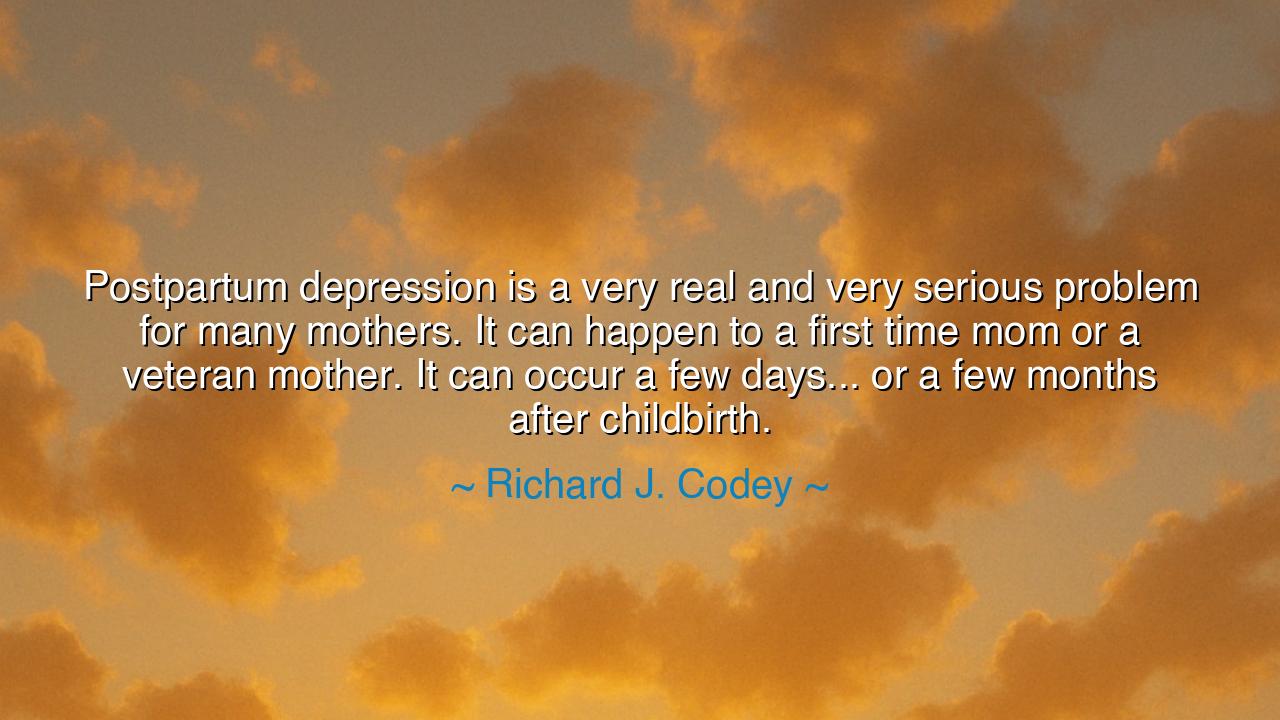
Postpartum depression is a very real and very serious problem for
Postpartum depression is a very real and very serious problem for many mothers. It can happen to a first time mom or a veteran mother. It can occur a few days... or a few months after childbirth.






In the solemn truth spoken by Richard J. Codey, we find a message both compassionate and ancient in its wisdom: “Postpartum depression is a very real and very serious problem for many mothers. It can happen to a first time mom or a veteran mother. It can occur a few days... or a few months after childbirth.” These words are not merely medical — they are moral and human. They remind us that even in the sacred act of giving life, the heart of the mother may tremble in silence. The same hands that cradle new life can, in the next breath, struggle to hold themselves steady. Postpartum depression is not weakness; it is the shadow cast by immense love and responsibility, a wound that deserves understanding, not shame.
In the days of the ancients, childbirth was seen as both miracle and trial — a moment where the boundary between life and death grew thin. Women were praised for their courage, yet their silent suffering was often unseen. What Codey gives voice to is a truth long buried in history: that the mind and spirit of the mother need healing as much as her body. To bring life into the world is to cross a threshold — and sometimes, when one returns, the light feels different, colder, strange. This is the moment when compassion must rise — not in pity, but in reverence for the journey a mother has endured.
There is an old story from Japan of a woman named Otsuya, who after giving birth, began to weep each morning for reasons she could not name. Her family thought it was exhaustion, but the sadness deepened. It was only when an old midwife recognized her suffering and told her, “Your heart is still catching up to your body,” that healing began. The midwife did not offer medicine, but understanding — and from that understanding came strength. This story, like Codey’s message, reminds us that acknowledging a mother’s pain is the beginning of her recovery.
Postpartum depression does not choose by wealth, wisdom, or experience. It can strike a young mother holding her first child or an older one who has raised many. It is not a failure of love, but rather the proof of it — for only those who love deeply enough to give life can feel the weight of that responsibility so fully. The hormones shift, the body aches, the nights are endless — but what breaks the spirit most is the silence around it. Too often, society expects mothers to be radiant, unbreakable, smiling through the exhaustion. Yet as Codey’s words remind us, to deny the truth of their pain is to deny part of their humanity.
Consider the story of Brooke Shields, who spoke openly of her own postpartum struggle. Though she was a beloved actress, she faced darkness after the birth of her child — feelings of despair she could not explain. It was only through speaking out that she helped countless others find courage to seek help. Her honesty, like Codey’s advocacy, lifted a veil that had long covered the suffering of countless women. Through such voices, the world begins to understand that to help mothers heal is to protect the next generation.
The ancients would have seen in this condition not a curse, but a sacred imbalance — the price of carrying the divine weight of creation. To restore balance, they would gather community, song, and care around the new mother, recognizing that no one heals alone. In our modern age, we must rediscover that wisdom. The medicine is not only in the clinic but in compassion, patience, and shared presence. When a mother is surrounded by understanding hearts, her spirit finds its way back to peace.
So, let this teaching endure: Honor the mothers who struggle. When they fall silent, listen. When they falter, stand beside them. Never tell them to “be strong,” for they already are; instead, remind them that it is all right to be human. Let families, communities, and nations remember that the health of the world begins in the heart of a mother. To care for her is to care for all. For as Richard J. Codey has taught, postpartum depression is real, it is serious, and it is human — but through awareness, compassion, and unity, it can be healed.
And to those mothers who walk in that shadow even now: know this — your pain does not diminish your love, your worth, or your strength. Like the dawn that rises after the coldest night, your heart too will find its light again.






AAdministratorAdministrator
Welcome, honored guests. Please leave a comment, we will respond soon